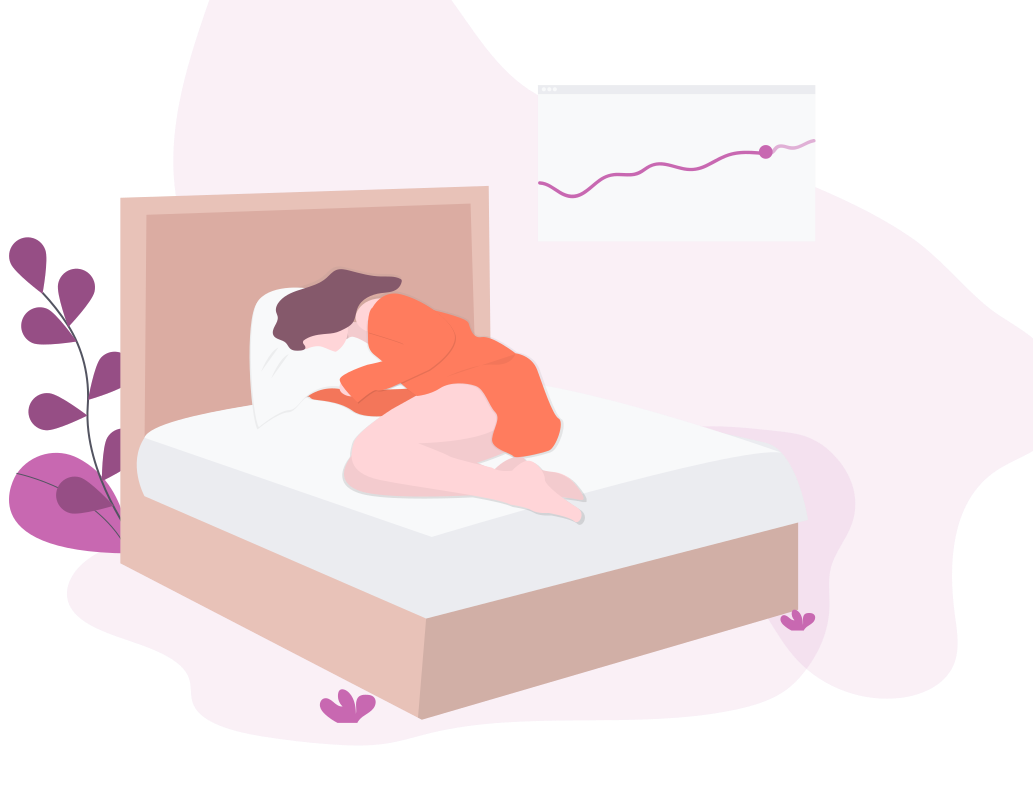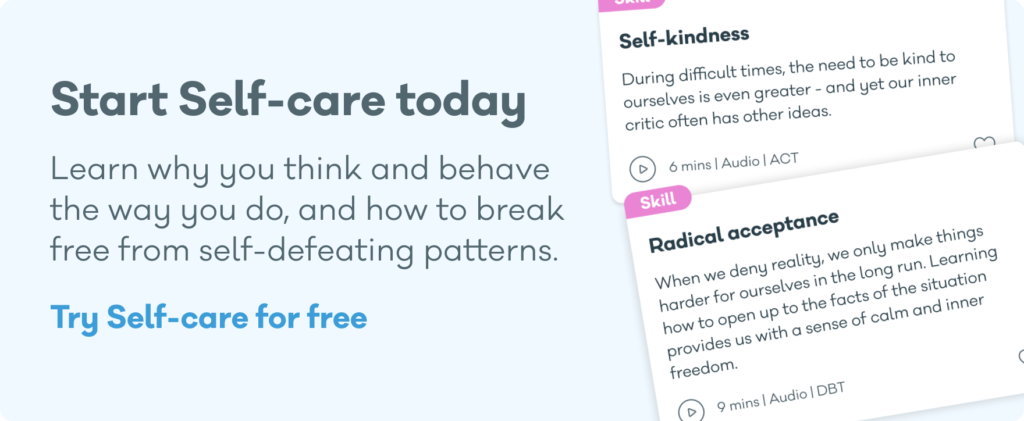During the first lockdown, we trained for our first 5k, perfected the art of baking banana bread and knitted and stitched with gusto.
But now that it’s a year since the Covid pandemic first started, it feels like the mood is considerably less buoyant.
Many of us are experiencing what has been hailed as ‘lockdown fatigue’ — a gradual, paralysing feeling of lethargy in the wake of lockdown — and it’s completely understandable.
It’s hard not to feel bogged down with the news cycle, the on and off again lockdowns and our restricted social lives.
And that’s to say nothing of key workers who are burning the candle at both ends to keep the country ticking along.
Covid-19 has upended life as we know it and, even though we now have a finish line in sight you might feel like you’ve hit a ‘pandemic wall’.
That’s why it’s extra important that we look after ourselves, especially in this final sprint.
Getting a better understanding of what causes ‘lockdown fatigue’ — and how best to cope with it — can help you power through the remaining few months as restrictions begin to lift.
With this in mind, we’ve compiled a series of tips to help you beat the slump and keep on going.
Remember that you’re resilient. You’ve come this far and — although it may not feel like it now — this won’t last forever.
What is lockdown fatigue?
‘Lockdown fatigue’ is a term that’s bandied around a lot these days, and though it isn’t an actual clinical diagnosis, it’s something which many of us can relate to.
It can manifest in many ways but, in essence, ‘lockdown fatigue’ refers to the impact of having to deal with the rollercoaster of emotions brought on by Covid-19.
Routines have been upended, relationships have been strained, financial worries have heightened, and at the same time, we’ve had to get to grasps with an uncertain future.
Add this to disrupted sleep patterns and real-life health complications, and fatigue is to be expected.
We’re facing hurdles on all fronts so it’s no surprise that it’s taking its toll on our mental and emotional health.
For several months we’ve had to hold it together through what has probably been one of the most stressful life events we’ve ever faced. And we’ve had to do it all without the resources we usually have available to us.
In many ways, ‘lockdown fatigue’ could best be described as widespread burnout that’s linked to Covid and the subsequent lockdowns.
What does lockdown fatigue look like?
Lockdown fatigue has hit everyone differently but the overarching feeling is one of exhaustion, a lack of focus, as well as lower motivation.
On top of this, some people have also experienced forgetfulness and difficulty concentrating (sometimes referred to as ‘brain fog’), with some patients even highlighting it as a lasting effect of ‘long-Covid’.
These symptoms are only exacerbated by anxiety and stress, which were on the rise even before the pandemic. But now they’re amplified further by financial worries, health anxieties and the mounting responsibilities that have emerged in wake of the pandemic.
Overall our stress and cortisol levels may be higher and we might feel like we’re in a constant state of ‘fight-or-flight’ mode, because we’re surrounded by tangible problems.
We’re in a “higher arousal state”, and keeping the body in this high state of alert can really take its toll on our energy levels, leaving us feeling exhausted and burned out.
We’ve experienced a potent melting pot of emotions, and understandably it may have disrupted our sleeping patterns too. This can leave us feeling irritable and cranky and it’s only natural that we’d struggle to regulate our emotions when we’re in this mood.
How to tackle lockdown fatigue
From dealing with negative thought patterns to getting a good night’s rest, we’ve compiled a series of tips to help you shake off the lockdown slump.
Start with sleep
When our sleep is disrupted it’s often a sure-fire sign that something’s going on under the surface. That’s because our sleep and mental health are closely connected — and it goes both ways.
With this in mind, when tackling lockdown fatigue, evaluating our sleeping habits is a great place to start. That’s because a good night’s shut-eye anchors our day and creates structure. It also allows us to maintain a regular circadian rhythm, which helps us maintain positive energy levels. We all know how irritable and cranky we can be when we don’t get enough sleep so it makes sense that it would help boost our mood too.

The first step is to develop a good sleep routine. Try to consistently go to bed at the same time each day and give yourself time for around seven or nine hours of sleep.
That way your body will naturally drift off to sleep at the same time at night. It’s also helpful to set a curfew on things that affect sleep quality, such as alcohol, caffeine and big meals.
Because stress and anxiety can cause sleeping problems, take care to unwind before bed too. Don’t have a lot of screen time before bedtime and avoid high-intensity activities such as emotional movies or studying. These can leave us feeling wired and can make it harder to fall asleep.
Check out the ‘Get a better night’s sleep’ collection in Self-care for more tips and advice on sleep hygiene. But if sleep problems become a regular occurrence, it may be worth speaking to your GP or a therapist as they’ll be able to help you if you have a sleep disorder such as insomnia.
Follow a schedule
When fighting fatigue, don’t underestimate the power of a good routine. In lockdown, it’s easy for the hours to blur into one, especially if you’ve been made redundant or are on furlough. But we may become listless when we have no structure.
If we schedule time for work, eating, sleep and relaxation it may make us feel less anxious and more in control. It also allows us to separate parts of the day, which is particularly important when so many of us are working and living in the same space.
When plotting your day, you might find it helpful to spend time outdoors. That’s because spending time in nature has been found to reduce our cortisol levels and alleviate stress. Also, be sure that your work life doesn’t bleed into your home life by resisting the temptation to answer emails or calls after work hours.
Some people find that a morning routine helps them to start the day off right. But don’t put too much pressure on yourself.
Sometimes we say we’ll wake up early and be productive. And if we fail to do that it can leave us feeling unmotivated — like we’ve ‘wasted the day’.
If this happens, practice self-compassion. Remind yourself that you’re only human and we all need a lie-in every once in a while. The start of your day doesn’t define how the rest of the day will go.
Breathing exercises
Mental health professionals often shout about the merits of deep breathing and it’s easy to see why. When we’re anxious, our breathing tends to be fast, shallow and irregular.
It can leave us feeling lightheaded and out of control, and, when this happens, it can leave us feeling even more anxious. It’s a vicious cycle — but breathing exercises can do the world of good.
Essentially, you want to find a way to exhale longer than you inhale. That way your heart rate will slow down and you’ll activate the parasympathetic nervous system — the part of our nervous system that helps us feel calm and relaxed.
To see this in practice try the ‘Sleep exercise’ in Self-care. It’ll help you clear your head and nod off to sleep.
Challenge unhelpful thinking patterns
We’ve all been there. We’re just about to shut our eyes and go to sleep. But suddenly our minds go into overdrive, ruminating over our past mistakes and mulling over worst-case scenarios.
Psychologists call these thinking traps or cognitive distortions. These are deeply ingrained negative thinking patterns that prevent us from seeing things as they really are. They cloud our judgement and, if left unchecked, can lead to feelings of anxiety and depression.
Some common thinking traps include:
- Black-and-white-thinking (otherwise known as all-or-nothing thinking): This is when we split the world into two extremes and see things in polar opposites — good or bad, a success or a failure.
- Personalisation: We wrongly take responsibility for external events which are out of our control.
- Jumping to conclusions: When we overestimate the likelihood of something bad happening and underestimate our ability to cope
- Shoulds and musts: When we have very specific expectations for how we – or other people – should behave, and over-emphasise the repercussions if we don’t meet these expectations.
- Magnification and minimisation: Magnification describes when we exaggerate our mistakes, worries and imperfections, making them more significant than they actually are. On the flip side, minimisation is when we lessen the importance of our achievements, positive qualities and strengths, making them less significant than they are.
- Emotional Reasoning: When we base our view of a situation, or ourselves, on the emotions we are feeling rather than thinking logically.
Avoiding thinking traps involves identifying them, challenging them and proposing new ways to think about the situation. It takes practice but with time it will get easier.
If you need help tackling these thinking traps, therapies such as Cognitive Behavioural Therapy could be just what you’re looking for.
Stay connected
We get it. Another Zoom call might be the last thing you feel like doing. But it would be an understatement to say that socialisation is vital right now.
Lockdown is a shared human experience and you’re not alone in feeling fatigued. Chatting with a friend will not only help you feel less isolated, but it will help you realise that you’re not alone in feeling this way.

Find purposeful, intentional ways you can connect with others or why not show your loved ones a random act of kindness. It might be the pick-me-up they need.
Plus, doing nice things for others has been found to boost our serotonin levels.
Practice self-care
Lockdown fatigue often points to a lack of self-care — an imbalance in what we’re giving out to the world and taking back for ourselves.
Remember it’s not selfish to take time to recharge. If anything, by treating ourselves with care and compassion, we’re more likely to have the energy and resilience to care for others too. As such, self-care care is critical.
Self-care can take many forms. You might cook a nutrient-rich meal or exercise. You might journal how you’re feeling, have a long soak in the bath or schedule quality time with your partner. It’s all about being mindful and doing activities that nourish you.
Open up
Sleep is often a barometer for our mental and emotional health. So if we’re struggling to get a good night’s rest, it’s worth exploring how we’re feeling.
Sleeping disorders such as insomnia are often tied to anxiety, depression or high levels of stress. So it’s unsurprising then that speaking to a mental health professional may offer some relief.
A psychologist will help you sift through your emotions and get to the root of what’s causing your fatigue. And they’ll provide you with the skills and coping mechanisms you need to help you navigate life as the world gradually begins opening up.

